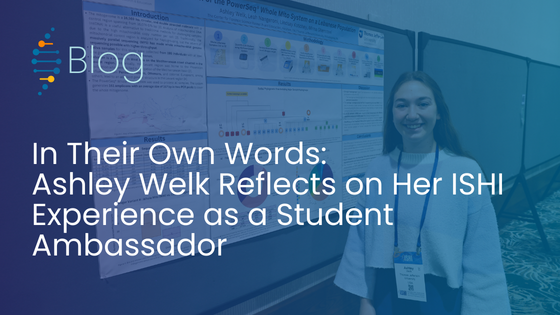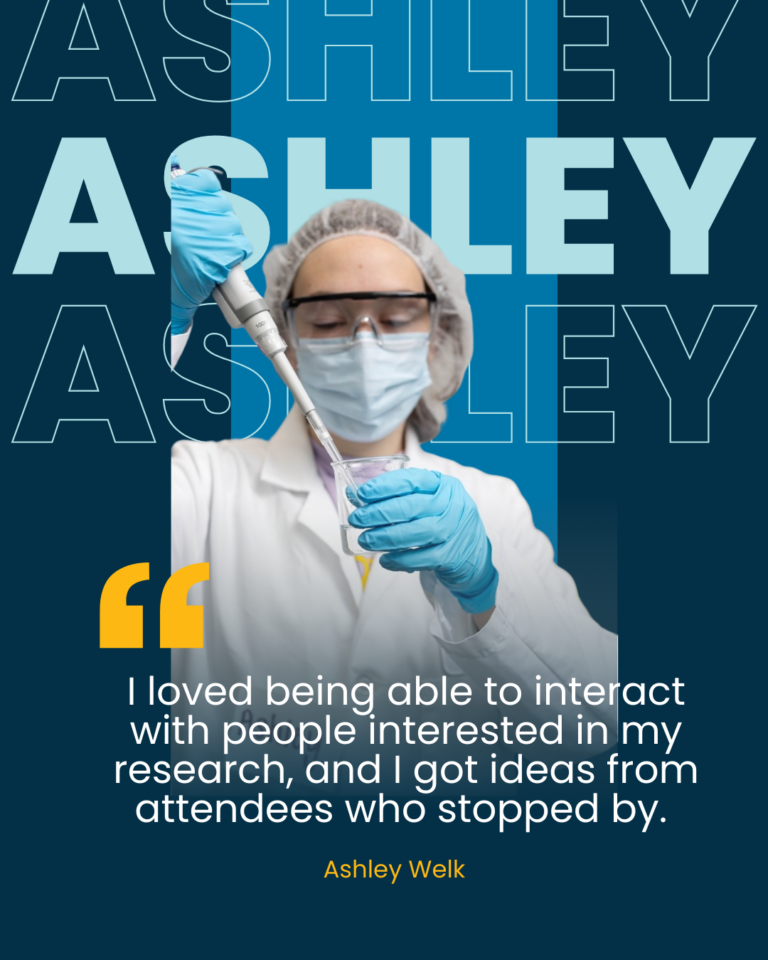Are you a passionate student pursuing a degree in forensic science, eager to dive into the world of cutting-edge research and groundbreaking advancements? Look no further! The ISHI Student Ambassador Program is your exclusive gateway to unparalleled opportunities at the International Symposium on Human Identification (ISHI) conference. The application window opens on February 3, 2025.
Every year, the International Symposium on Human Identification (ISHI) brings together forensic professionals from around the world to share their latest research and connect with peers. But some of the most inspiring moments come from the students—those just starting their journey into the world of forensic science. As part of the ISHI Student Ambassador Program, young scientists are given the opportunity to present their work, engage with leaders in the field, and gain invaluable insights into the profession. In this blog, we sit down with Ashley Welk, a student at Thomas Jefferson University and one of this year’s ambassadors to hear about her experiences at ISHI. From connecting with peers to exploring new research methodologies, these reflections offer a unique glimpse into the future of forensic science.

Attending ISHI as a student ambassador, was this your first major forensic science conference? How did the reality of attending the event, interacting with experts, and presenting your research compare to the expectations you had going in?
ISHI was my first major forensic science conference, and I could not have had a better experience. Before attending I was a little nervous because I didn’t quite know what to expect, however, as soon as I arrived, I was pleasantly surprised. The experts at the conference were very welcoming and took the time to talk to you if you approached them. The same thing was true for the vendors. I had so many pleasant conversations and tried to take advantage of the opportunity as much as I could. As for presenting my research, the poster sessions were relaxed and allowed me to feel at ease. I loved being able to interact with people who were interested in my research, and I both learned a lot and got ideas about my research from attendees who stopped by.
With your interest in research that can improve forensic biology methods, such as DNA transfer and cell separation in sexual assault investigations, were there any new techniques or advancements showcased at ISHI that inspired you? How do you plan to incorporate those ideas into your current or future projects?
Two advancements in technology stuck out to me throughout the conference: Promega’s bioengineered polymerase, and the use AI in analyzing DNA profiles. First, the engineered polymerase struck me because it was such a clever idea to improve the root cause of stutter instead of dealing with it during analysis and interpretation. The data presented was extremely promising and could really make a difference in casework by reducing the time analysts need for distinguishing stutter from allelic peaks. The presentation on AI in forensic analysis was interesting to me because this field is booming right now. AI is being integrated in many fields, so it follows that forensics would also be influenced by the technology. I am very eager to see how artificial neural networks will be implemented and validated in casework. I would also be curious to see how AI analysis and artificial neural networks could be implemented in an NGS context which is what I am most interested in.

You presented a scientific poster evaluating the Promega PowerSeq® Whole Mito System on a Lebanese population. What was the feedback like from experts and peers at ISHI, and did any of the discussions lead you to think differently about the application of mitochondrial sequencing in forensic investigations?
Going into the conference I had some results that I found unexpected, so I was very excited to get feedback from experts and peers. After speaking with people interested in my research during the poster session, I was given recommendations for multiple experts to get in contact with to answer questions about my results. I am now in the process of reaching out to these experts to get their insight, so the connections from being able to present have been invaluable. I also enjoyed that attendees were willing to ask me questions because it made me think about aspects of my research and results that I hadn’t thought of before. Now I can use these questions to guide more data analysis.
One of the most valuable aspects of ISHI is the opportunity to network with both seasoned professionals and peers. What was your experience like connecting with other student ambassadors and early-career professionals, and how do you think those relationships will impact your future in the field?
The opportunity to be a student ambassador was so helpful for networking. I was lucky to be able to connect and interact with the other student ambassadors and learn about their research and interests. I was truly inspired by their kindness and passion for forensic science, and I know that ISHI was just the starting point for our relationships. I hope to keep these connections strong and hopefully meet back up at future conferences, have continuing conversations about human identification, and collaborate on future research.
Based on your discussions with established experts, how did ISHI help you balance the idea of pursuing a career in casework as a DNA analyst versus continuing in research? Has the experience at ISHI clarified which path you’re more drawn to?
This is a really difficult question because I was able to see so many presentations highlighting groundbreaking research, but also how this research intimately affects people’s lives through implementation in casework. However, I have to say that conversations with experts and the other student ambassadors who are actively engaged in research stayed with me and has definitely guided my thoughts about my career after completing my Master of Forensic Biology. I hope to be able to continue to participate in and focus on the research side of the field with the main goal of pursuing projects that can directly improve casework and help analysts and technicians in day-to-day operations.

